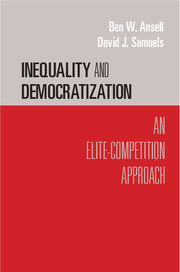Book contents
- Frontmatter
- Contents
- List of Tables
- List of Figures
- Preface
- I Introduction
- 2 Inequality, Development, and Distribution
- 3 Actors and Interests
- 4 An Elite-Competition Model of Democratization
- 5 Assessing the Relationship between Inequality and Democratization
- 6 Inequality and Democratization: Empirical Extensions
- 7 Democracy, Inequality, and Public Spending: Reassessing the Evidence
- 8 Democracy, Redistribution, and Preferences
- 9 Conclusion
- Bibliography
- Index
7 - Democracy, Inequality, and Public Spending: Reassessing the Evidence
Published online by Cambridge University Press: 05 January 2015
- Frontmatter
- Contents
- List of Tables
- List of Figures
- Preface
- I Introduction
- 2 Inequality, Development, and Distribution
- 3 Actors and Interests
- 4 An Elite-Competition Model of Democratization
- 5 Assessing the Relationship between Inequality and Democratization
- 6 Inequality and Democratization: Empirical Extensions
- 7 Democracy, Inequality, and Public Spending: Reassessing the Evidence
- 8 Democracy, Redistribution, and Preferences
- 9 Conclusion
- Bibliography
- Index
Summary
INTRODUCTION
The utility of any theory of democratization depends on the descriptive and predictive accuracy of its core assumptions. In this chapter, we illustrate the fruitfulness of our elite-competition approach by turning to the question of the relationship between political regimes, inequality, and social-welfare spending.
The Meltzer-Richard model assumes that, under democracy, inequality increases the median voter's demand for redistribution, which takes the form of pure public goods distributed equally to everyone. Our argument, by contrast, holds that groups demand democracy because they want to rein in autocratic elites' ability to tax and expropriate their wealth and income. Building on the model in Chapter 4, here we also assume that government social-welfare programs can be targeted, so that they do not necessarily benefit everyone equally. This is a more realistic approach, as much social spending in the real world actually benefits relatively wealthier citizens (Lizzeri and Persico 2004; Moene and Wallerstein 2001; Ross 2006).
We expect elite competition to continue to matter after regime change. The former autocratic elites should oppose any form of redistribution, and to the extent that they remain important political players even under universal suffrage, redistributive spending should be lower. Likewise, we would not expect a newly empowered bourgeoisie to dramatically increase social-welfare spending, but to use tax revenue to fund infrastructure investment designed to help grow the economy, in particular the urban industrial sectors. To the extent that the bourgeoisie implement social-welfare programs, they should seek to target benefits to members of their own group rather than implement universalistic redistribution that primarily benefits those further down the income scale.
As for the masses, although under full democracy their electoral weight should increase purely redistributive social-welfare spending, their influence will be mitigated to the extent that wealthy citizens – both the former incumbent elite and the arriviste bourgeoisie and middle classes – dominate politics. Since land and income inequality proxy for the relative political strength of such groups, our elite-competition approach predicts that although democracy might have a positive effect on social-welfare spending, redistribution should decline as both forms of inequality increase. Moreover, inequality should have the strongest impact on purely redistributive social-welfare programs rather than those that target relatively wealthier citizens.
- Type
- Chapter
- Information
- Inequality and DemocratizationAn Elite-Competition Approach, pp. 141 - 170Publisher: Cambridge University PressPrint publication year: 2014

